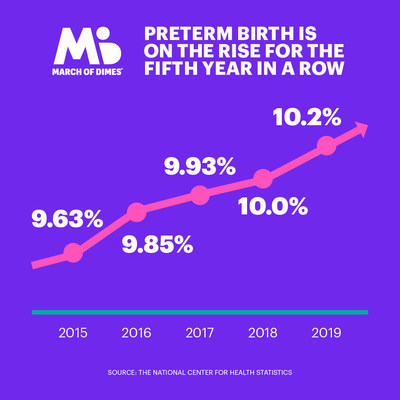New March Of Dimes Report Card Shows Preterm Birth Rates Climb For 5th Straight Year, Earning The Nation A “C-" Grade Humana Foundation and March of Dimes are partnering in six communities nationwide to implement strategies to improve maternal and infant health
New March Of Dimes Report Card Shows Preterm Birth Rates Climb For 5th Straight Year, Earning The Nation A "C-" Grade
Humana Foundation and March of Dimes are partnering in six communities nationwide to implement strategies to improve maternal and infant health
ARLINGTON, Va., Nov. 16, 2020 /PRNewswire/ -- March of Dimes, the nation's leader in the fight for the health of all moms and babies, has issued its new 2020 Report Card amid the coronavirus pandemic and calls for racial justice, shining a spotlight on factors that contribute to maternal and infant health. The U.S. remains among the most dangerous developed nations for childbirth and it's even more dire for women and babies of color. The Report Card shows that for the fifth year in a row, the U.S. preterm birth rate increased to 10.2% of births, earning the nation a "C-" grade compared to last year's "C" grade. Preterm birth is a leading cause of infant mortality, which has slowly declined over the past few years. Yet, still in the U.S. two babies die every hour and two women die from pregnancy complications every day.
These statistics are worse for moms and babies of color – with the Report Card showing significant racial disparities that cut across maternal and infant health. Women of color are up to 50% more likely to give birth preterm and their children face up to a 130% higher infant death rate. Disparities in preterm birth have increased over the past several years in the U.S. The disparity ratio for preterm birth, a measure that tracks progress to eliminating racial/ethnic disparities shows that disparities have worsened in recent years by about 5%. Additionally, Black and American Indian/Alaskan Native women are up to three times more likely to die from pregnancy related complications compared to White women.
While there is no single cause to this complex maternal and infant health crisis, contributing factors include maternal health and management of preexisting conditions. They also include social determinants of health such as being uninsured, living in poverty and having inadequate prenatal care – which again the Report Card shows most often affect women of color. Additionally, systemic challenges with health care systems and deeply entrenched structural racism are helping to fuel this health equity gap. March of Dimes supports and advocates for policies that concentrate on the health of all moms and babies and improve health outcomes especially for women of color.
"Although there has been some incremental progress in advancing policies that will address better maternal and infant health care, this progress is not happening quick enough, and is tempered by increasing racial/ethnic health care disparities in preterm birth," said Stacey D. Stewart, President and CEO of March of Dimes. "At a time of racial awakening in our nation, we must amplify our efforts to decrease deaths and health challenges facing our nation's moms and babies and enact new policies that support health equity."
The Report Card shows that almost 21,500 babies were lost in 2018 compared to 22,341 babies in 2017. Infant mortality rates have declined due to changes in maternal age – including a decline in teen births in the U.S. – decreases in adult smoking rates and decreases in death from Sudden Infant Death Syndrome. The leading causes of infant death include birth defects, preterm birth and low birth weight, maternal complications and sudden infant death syndrome. This year's report also includes information on states' efforts on Medicaid expansion, Medicaid postpartum coverage extension, Maternal Mortality Review Committees, Perinatal Quality Collaboratives, and other key factors including health insurance status, inadequate prenatal care, poverty level and race and ethnicity disparity ratios.
"A priority for March of Dimes is to close the health equity gap across the country," said Dr. Rahul Gupta, Chief Medical and Health Officer, Senior Vice President, and Interim Chief Scientific Officer at March of Dimes. "Using the concrete, detailed evidence in the 2020 Report Card, we can identify common-sense steps to reverse the alarming trends. A part of this work, we recognize a lack of uniform reporting and inconsistent access to real-time maternal and infant health data is impeding progress. Particularly during a pandemic, we need access to robust, uniform data sharing to inform evidence-based strategies that can be implemented across public and private sectors to address the specific needs of this crisis."
Actions to Improve Maternal and Infant Health
March of Dimes works every day with individuals and organizations across the country to combat the maternal and infant health crisis through research, education, advocacy and programs. For example, with support from the Humana Foundation, March of Dimes is mobilizing cross-sector partners to address health equity at the national level through its Mom & Baby Action Network and in six communities: Atlanta, GA (Fulton County); San Antonio, TX (Bexar County); Miami, FL (Miami-Dade County); Chicago, IL (Cook County); Louisville, KY (Jefferson County and Hardin County); Broward County, Florida; Shreveport, LA (Caddo Parish); and New Orleans, LA (Orleans Parish). The partners will build a common agenda and deploy strategies to address the underlying causes and system challenges that negatively impact maternal and infant health within a community. The Mom & Baby Action Network will serve as the national backbone of support for these local communities and share best practices to drive systems change to eliminate the health equity gap.
"The Humana Foundation decided to invest in March of Dimes to help address social determinants of health and systemic racial inequity, barriers that the COVID-19 health crisis amplified for the most vulnerable among us," said Walter D. Woods, CEO of The Humana Foundation. "It is our hope to address those barriers and close the health equity gap for mothers and children across the country through the Mom & Baby Action Network."
Additionally, March of Dimes advocates for federal legislation that prioritizes the health of our nation's moms and babies. The Helping MOMS Act of 2020, Maternal Health Quality Improvement Act of 2020 and Black Maternal Health Momnibus Act of 2020 are examples of critically important policies that offer comprehensive solutions needed to address the health crisis head on. State and local legislation is also needed to fill the gaps associated with access to maternity care for women in rural and underserved communities. Just as important is education and implicit bias training to equip health care professionals with the tools they need to eliminate institutional racism in our health care system and provide more culturally competent care no matter where they practice.
Through the #BlanketChange movement, March of Dimes is urging policymakers and political candidates to protect and improve maternal heath by taking immediate action on series of policies to address equity, access and prevention. To learn more about the #BlanketChange agenda, visit BlanketChange.org.
To view the Report Card and actions you can take support moms and babies, visit marchofdimes.org/ReportCard.
2020 March of Dimes Preterm Birth Grades
The Report Card grades the nation, 50 states, the 100 largest cities and Puerto Rico on rates of preterm birth. Overall preterm birth rates worsened in 39 states and Washington D.C., with eight states—Alabama, Arkansas, Georgia, Louisiana, Mississippi, Oklahoma, South Carolina, West Virginia—and Puerto Rico earning a failing grade compared to six last year. Between the 2019 and 2020 Report Cards, 25 states and Washington, D.C. had worse grades, 23 states and Puerto Rico had grades that stayed the same and only two states had grades that improved.
- 8 states and Puerto Rico earned a "F" (Alabama, Arkansas, Georgia, Louisiana, Mississippi, Oklahoma, South Carolina and West Virginia)
- 2 states earned a "D-" (Kentucky, Tennessee)
- 2 states earned a "D" (Missouri, Texas)
- 8 states and Washington, DC earned a "D+" (Delaware, Florida, Hawaii, Illinois, Ohio, Nebraska, Nevada, North Carolina)
- 6 states earned a "C-" (Indiana, Kansas, Maryland, Michigan, New Mexico, Wisconsin)
- 5 states earned a "C" (Alaska, Pennsylvania, Utah, Virginia, Wyoming)
- 10 states earned a "C+" (Arizona, Colorado, Connecticut, Iowa, Minnesota, Montana, New Jersey, North Dakota, Rhode Island, South Dakota)
- 4 states earned a "B-" (California, Maine, Massachusetts, New York)
- 1 state earned a "B" (Idaho)
- 4 states earned a "B+" (New Hampshire, Oregon, Vermont, Washington)
- 0 states earned an A/A-
Additionally, the Report Card ranks the 100 largest U.S. cities based on their 2018 preterm birth rate. One hundred cities account for 24.7% of all births in the U.S. and 25.4% of all preterm births. Among the 100 cities, 1 in 4 (27%) received an F grade. The states with the most cities among the top 100 are California (12), Texas (18), New York (7), Florida (4). The states with most cities in the "F" category are Texas (4) and Ohio (4). Detroit, MI has the worst (highest) preterm birth rate at 15.2 percent.
The 10 cities with the highest rate of preterm births are (ranked in order, lowest to highest):
-
- St Louis, MO
- Buffalo, NY
- Tulsa, OK
- Milwaukee, WI
- Memphis, TN
- Baton Rouge, LA
- New Orleans, LA
- Birmingham, AL
- Cleveland, OH
- Detroit, MI
About March of Dimes
March of Dimes leads the fight for the health of all moms and babies. We support research, lead programs and provide education and advocacy so that every baby can have the best possible start. Building on a successful 80-year legacy of impact and innovation, we empower every mom and every family.
Visit marchofdimes.org or nacersano.org for more information. Visit shareyourstory.org for comfort and support. Find us on Facebook and follow us on Instagram and Twitter.
View original content to download multimedia:http://www.prnewswire.com/news-releases/systemic-racism-access-to-care-poverty-and-preexisting-conditions-help-fuel-us-maternal-and-infant-health-crisis-particularly-devastating-for-moms-and-babies-of-color-301173163.html
SOURCE March of Dimes






